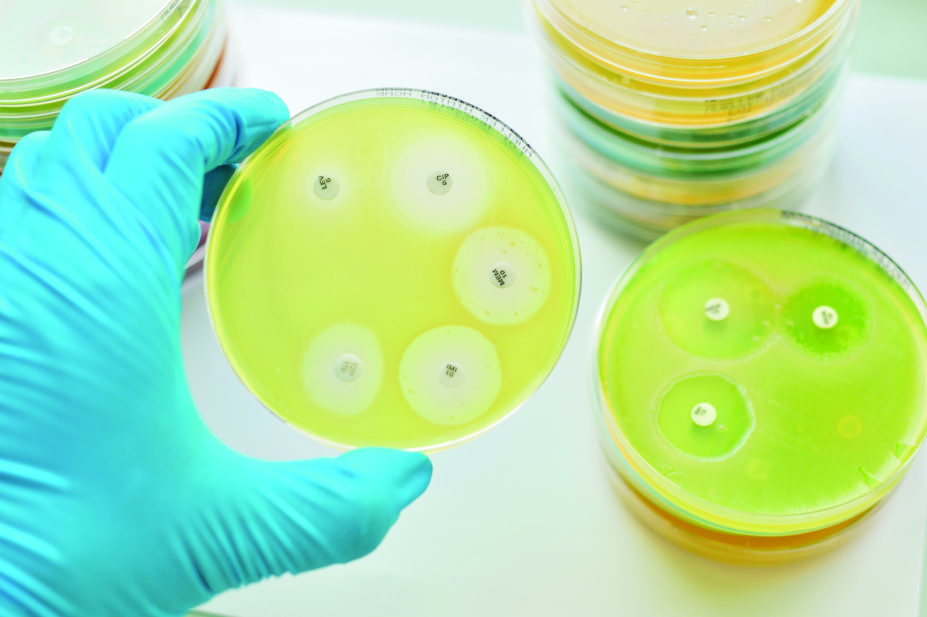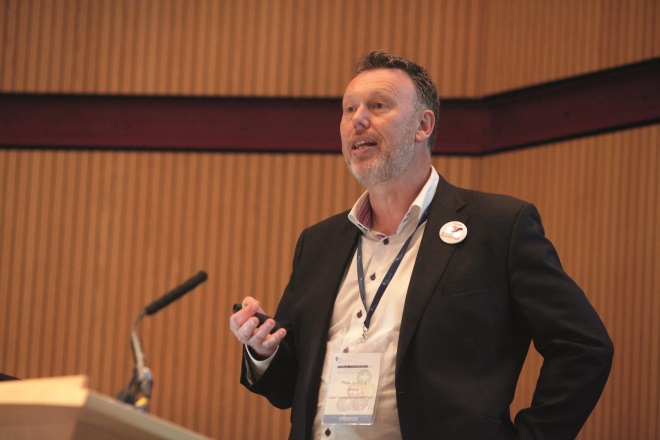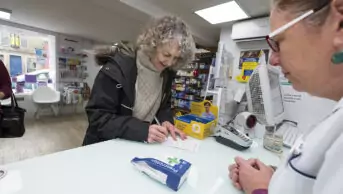
Shutterstock.com

Source: Nadia Attura
Philip Howard, consultant antimicrobial pharmacist and RPS spokesperson on antibiotics, says antimicrobial resistance is one of the greatest threats facing the planet, estimated to contribute to 700,000 deaths globally every year
The Royal Pharmaceutical Society (RPS) has launched a major new campaign calling on all pharmacists to play a greater role in safeguarding antibiotics and minimising the spread of antimicrobial resistance (AMR).
The Society is encouraging pharmacists to get involved in developing national and local action plans for antimicrobial stewardship (AMS) to ensure a “robust evidence-based approach to the use of antibiotics”.
Resistance to antimicrobials is estimated to contribute to around 25,000 deaths a year in the EU, and around 700,000 deaths a year around the world. Overuse of antibiotics — for example, taking the drugs for viral infections, or for minor self-limiting ailments — hastens the development of antimicrobial resistance (AMR), as does the misuse of appropriately prescribed antimicrobial medication.
Philip Howard, consultant antimicrobial pharmacist and RPS spokesperson on antibiotics, said: “Antimicrobial resistance is one of the greatest threats facing the planet, estimated to contribute to 700,000 deaths globally every year.
“The challenge is to coordinate action nationally as well as globally, and pharmacists across all sectors can play a vital role in terms of patient care as well as leading on action planning.”
AMS is an organisational or system-wide approach to the safeguarding of antibiotics, with the aim of minimising the spread of antimicrobial resistance. Interventions include preventing the inappropriate prescribing of antimicrobials, ensuring that appropriately-prescribed drugs are used correctly, promoting non-antimicrobial treatments where suitable, and advising patients on infection prevention measures.
At the core of the new campaign, launched today (3 September 2017) at the RPS annual conference in Birmingham, is the Society’s new AMS policy which makes six key recommendations on how the sector’s expertise should be used to minimise antimicrobial resistance, and sets out the RPS’s commitments towards achieving that goal.
The policy recommends that pharmacists should lead on developing all national and local action plans for AMS, that more research into simple diagnostic testing should be commissioned, and that effective collaboration across the multidisciplinary health and social care sectors, with pharmacist expertise at the heart of this, should be a priority.
The RPS has also produced a new quick reference guide to AMS for community pharmacists.
The Society has said its new campaign will “contribute to global efforts in reducing antimicrobial resistance”.
In May 2016, then prime minister David Cameron pledged that by 2020, the UK would reduce inappropriate prescribing of antimicrobials by 50%. Referencing economist Jim O’Neill’s Review on Antimicrobial Resistance (AMR), Cameron said that if no action was taken to protect antimicrobials then, globally, we could expect to see “ten million excess deaths a year by 2050 … and the potential end of modern medicine as we know it”.
O’Neill himself described the consequences of a no-action scenario as “extremely disturbing”, adding that the projected figure of ten million annual deaths is “more people than currently die from cancer”.
Globally, the International Pharmaceutical Federation (FIP) and the Pharmaceutical Group of the European Union (PGEU) have both issued AMS guidance. Protection of antibiotics is also an urgent focus of [1]
the World Health Organization, which has issued a global action plan, and in May 2017, G20 health ministers pledged to implement national action plans for AMS by end of 2018.

Source: Nadia Attura
Ash Soni, president of the RPS, says there is a perception that antimicrobial stewardship is solely the domain of hospital pharmacists, but primary care and community colleagues also play an essential part in managing the challenge
Over the next few months, RPS members can expect to see a refresh to the AMS portal (a joint online initiative by the RPS and University College London, which signposts to online resources), a literature review to be published in The Pharmaceutical Journal, a local engagement toolkit, a media campaign, and a series of visits by ministers to sites undertaking drug discovery and research.
The campaign also aims to increase awareness of the varied roles of pharmacists in AMS, including those in academic and industry-based drug discovery and research, as well as hospital, primary care and community-based pharmacists.
“All pharmacists have a role to play in tackling AMR,” said Ash Soni, president of the RPS. “I think there’s a perception that antimicrobial stewardship is solely the domain of hospital pharmacists, but primary care and community colleagues also play an essential part in managing this huge challenge.
“Providing advice on self-care, how long infections can be expected to last and how to take antimicrobials as well as providing services such as flu vaccinations can make an enormous difference.”
RPS campaigns on antimicrobial stewardship
Antimicrobial stewardship has long been a policy and campaign focus of the Royal Pharmaceutical Society (RPS).
Responding to the UK Government’s Antimicrobial Resistance Strategy, published 13 September 2013, the RPS said that “Training of community pharmacists has the potential to reduce GP consultations by means of public education and symptomatic management of self-limiting infections”. In another response, to a 2014 NICE consultation on guidance for ‘Antimicrobial resistance: changing risk-related behaviours’ the Society said that the “use of minor ailment schemes whereby patients can receive symptomatic treatments for infections can decrease visits to a GP by 50% and reduce the number of prescribed antibiotics”.
In July 2014 the Society, together with the Royal College of General Practitioners (RCGP), the Royal College of Physicians (RCP), the Royal College of Nursing (RCN) and the UK Faculty of Public Health (FPH) published a Joint Statement on Antimicrobial Resistance. Among the recommendations of this statement was a call for antimicrobial prescribing data to be monitored, and for licensing requirements for new antimicrobials changed to include data on the minimum dosage required for clinical effectiveness.
In 2014, RPS Scotland collaborated with the Scottish Antimicrobial Prescribing Group (SAPG), Community Pharmacy Scotland and Pharmacy Voice to produce a European Antibiotic Awareness day resource pack for community pharmacists, which included a patient-directed self-care information leaflet for treating infectious ailments. The packs were distributed in November 2014.
Later that month, on European Antibiotic Awareness Day itself —18 November 2014 — RPS Scotland held a parliamentary reception and debate on antimicrobial resistance, sponsored by Jim Eadie MSP. The event led to a Scottish Parliamentary debate on the subject, held on 5 February 2015. Also on European Antibiotic Awareness Day, RPS Wales and the Royal College of General Practitioners (RCGP) held a lunchtime discussion with Welsh Assembly Members (AMs) on the use of antibiotics in primary care. During the summit, the two professional bodies called for Wales to commit to a public education campaign on the subject, and greater antimicrobial stewardship.
At the 2017 annual conference, the RPS launched its new GB-wide campaign on antimicrobial stewardship. The campaign aims to show how pharmacists are contributing to a targeted 50% reduction in inappropriate prescribing of antibiotics by 2020. As part of this campaign, the AMS portal— a hub for health professionals co-produced by the RPS and University College London — will be updated and relaunched.
Throughout all antimicrobial campaign and policy activity, the Antimicrobial Expert Advisory Group — chaired by antimicrobial pharmacist Harpal Dhillon —acts to advise the Society and shape policy on the subject.


